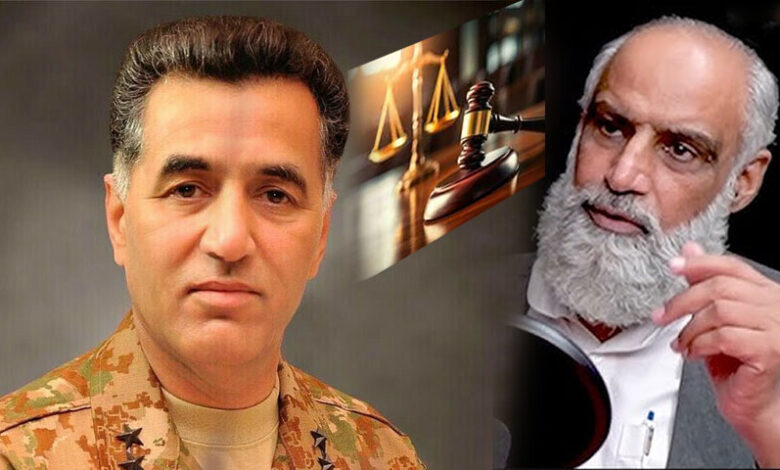Can Retired General Faiz Hameed Be Sentenced for Alleged Violations of the Army Act and Official Secrets Act?

Islamabad:Legal experts suggest that the fate of retired Lieutenant General Faiz Hameed, who is accused of violating the Army Act and the Official Secrets Act, will largely depend on the quality of the evidence presented against him. Experts have cited previous cases to illustrate how military trials have unfolded in the past, noting that both evidence and the legal framework play a crucial role in such cases.
For instance, former Brigadier Raja Rizwan, who was convicted for violating the Official Secrets Act on November 24, 2019, was sentenced to death. Similarly, on November 30, 2019, another retired army officer, Lieutenant General Javed Iqbal, was sentenced to 14 years in prison for similar charges, although his sentence was later commuted after a review of his case. These precedents provide a context for evaluating General Faiz Hameed’s case, with experts emphasizing the importance of the evidence presented by the prosecution.
Colonel (Retired) Inam Rahim, a lawyer with experience in military trials, stated in a special interview that the court-martial process is typically expedited, but in this case, it could take longer as the authorities have handled the preparation of the case with greater caution. He further noted that General Faiz Hameed’s health is a factor to consider, as he is currently receiving medical treatment.
### **Charges Against Faiz Hameed**
According to the Inter-Services Public Relations (ISPR), General Faiz Hameed faces severe charges related to his alleged involvement in spreading unrest in the country, especially surrounding the events of May 9, 2023. It is also alleged that he was involved in political activities after his retirement, which is a violation of military conduct regulations. His role in orchestrating protests and unrest is under investigation, along with potential links to political parties for personal gain.
### **Court-Martial and Legal Process**
Colonel Inam Rahim explained that military courts are established by a Lieutenant General and are typically presided over by a Major General. These courts operate similarly to civilian courts, with the difference being that the military court does not provide reasons for its verdict. However, the decision can be challenged in the Army’s appellate court and, in certain circumstances, even in the High Court.
Once the charges are presented, the accused is given the opportunity to appoint a lawyer, and evidence and witnesses are presented by the prosecution. The defense counsel then cross-examines these witnesses. Afterward, the accused can present their defense witnesses before the court. Once all proceedings are concluded, the court will determine whether the accused accepts the charges or not, followed by the pronouncement of the sentence.
### **Appeal Process**
Advocate Imran Shafiq, who has experience in military trials, explained that the main difference between civilian and military court proceedings is that military courts do not disclose their reasons for judgment. However, a decision made by a military court can be challenged in the Army’s appellate court. If the accused loses the appeal, they may challenge the decision in the High Court, as seen in the cases of FB Ali and Zahid Islam Abbasi, where the Supreme Court outlined three grounds on which military court decisions can be appealed.
### **Key Takeaways**
Legal experts agree that the outcome of General Faiz Hameed’s case hinges on the strength of the evidence presented by the prosecution. The court-martial proceedings will be closely watched as they unfold, and any potential sentence will depend on the legal framework and the facts of the case. Whether Faiz Hameed faces punishment under the Army Act and Official Secrets Act remains to be seen, as the trial progresses.






